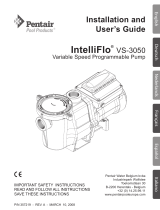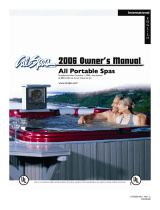
7
appliance in a safe way and understand the hazards involved. Children shall not play
with the appliance. Cleaning and user maintenance shall not be made by children
without supervision.
• To reduce the risk or injury, do not permit children use this product unless they are
closely supervised all times.
• To reduce the risk of child drowning, supervise children all times. Attach and lock spa
cover after each use.
• Make sure the floor is capable of supporting the expected load (≥ 500kg/m²).
• Adequate draining system must be provided around the spa to deal with overflow
water.
• To avoid damage do not leave the appliance empty for an extended period.
• To avoid damage to the pump, the spa must never be operated unless the spa is
filled with water.
• Immediately leave spa if uncomfortable or sleepy.
• To reduce the risk of injury:
• Lower water temperatures are recommended for young children and when spa
use exceeds 10 minutes. To avoid the possibility of hyperthermia (heat stress)
occurring it is recommended that the average temperature of spa-pool water
should not exceed 40°C (104°F).
• Since excessive water temperatures have a high potential for causing fetal
damage during the early months of pregnancy, pregnant or possibly pregnant
women should limit spa water temperatures to 38°C (100°F).
• Before entering a spa or hot tub the user should measure the water temperature
with an accurate thermometer since the tolerance of water temperature
regulating devices varies.
• The use of alcohol, drugs or medication before or during spa use may lead to
unconsciousness with the possibility or drowning.
• The use of alcohol, drugs, or medication can greatly increase the risk of fatal
hyperthermia in spas. The causes and symptoms of hyperthermia may be
described as follows: Hyperthermia occurs when the internal temperature of
body reaches a level several degrees above the normal body temperature 37°C
(98.6°F). The symptoms of hyperthermia include an increase in the internal
temperature of body, dizziness, lethargy, drowsiness, and fainting. The effect of
hyperthermia include failure to perceive heat; failure to recognize the need to
exit spa; unawareness of impending hazard; fatal damage in pregnant women;
physical inability to exit the spa; and unconsciousness resulting in the danger of
drowning.
• Obese persons or persons with a history of heart disease, low or high blood
pressure, circulatory system problem, or diabetes should consult a physician
before using a spa.
• Persons using medication should consult a physician before using a spa since
some medication may induce drowsiness while other medication may affect
heart rate, blood pressure and circulation.





















